The article Judging by the Cover by Bonny Gainley explains that no one should be discriminated on how the individual dresses and whatever messages it portrays to the public or in the workplace. Gainley stated “that no organization should try to change or accommodate the employee because he/she is unwilling to abide in the standards, unless when the standards are legal”. Likewise, Gainly uses emotion on her article because the reader can relate emotionally on the article. One emotional part is the reader has the freedom to how to dress or express themselves. Many of us will relate ourselves emotionally in that statement.
So, as we can see there is no set of global rules on how to try expressing ourselves in our profession or in our personal life. For example, she uses a person with uniform saying that he is a polic
...e officer and the other one is a gang member. Another example is the employed elementary school teacher, in which she stated that tattoos can be offensive to the parents and may bring bad influence to the children. However, the author also uses other information such as she stated that most companies prefer those people who are pleasing to the sight of their client.
As a result, those kind of companies are represented by their employees, and they want their employees to be attractive and trust looking. In our conclusion, we agree with Bonny Gainly. Everyone has the freedom to express theirselves. Any employer should not discriminate their employees’ base on their dressing style and cultural background. In support with this, according to the Federal Equal Employment Opportunity Law (EEO), that any applicants or employee
should not be discriminated according with their marital status, culture, age, religious affiliation, gender and political views.
We believe we cannot control tattoos and dressing style but we can put it in proper place. For instance, in a company who is more on customer service, the employees with tattoos can do some manipulation to their dress. In doing so, they can wear long sleeves and pants in their workplace as it is not against the company policy to hide their tattoos if it is offensive to others. Tattoos are part of cultural heritage of some country. In most African Nations, tattoos are rite of passage from boyhood to manhood.
Therefore, It is a cultural thing. And according to the law, it is guaranteed by our constitution and protected by the bill of rights. How effective is someone who was force to be something else just to get a job he/she needs? We believe that we can practice whatever we want as long as we are abiding to the laws and respecting the rights of others. So, people must be open-minded and not judgmental. We can never know other people’s ideas, passion and talents if we will put boundaries regarding to their physical appearance and beliefs.
- Business Law essays
- Contract essays
- Consumer Protection essays
- Property essays
- Ownership essays
- Agreement essays
- Common Law essays
- Contract Law essays
- Justice essays
- Security essays
- Tort Law essays
- United States Constitution essays
- Crime essays
- Lawsuit essays
- Treaty essays
- Family Law essays
- Marijuana Legalization essays
- Constitution essays
- War on Drugs essays
- Court essays
- Jury essays
- Police essays
- Protection essays
- Community Policing essays
- Criminal Law essays
- Judge essays
- Lawyer essays
- Employment Law essays
- Copyright Infringement essays
- Injustice essays
- Intellectual Property essays
- Breach Of Contract essays
- Jurisprudence essays
- Social Injustice essays
- Juvenile Justice essays
- Internet Privacy essays
- Cyber Security essays
- Bill Of Rights essays
- Civil Liberties essays
- First Amendment To The United States Constitution essays
- Fourth Amendment To The United States Constitution essays
- Second amendment essays
- Animal Cruelty essays
- Law Enforcement essays
- Juvenile Justice System essays
- Surveillance essays
- Forensic Science essays
- Crime Prevention essays
- Criminal Justice essays
- Criminology essays




